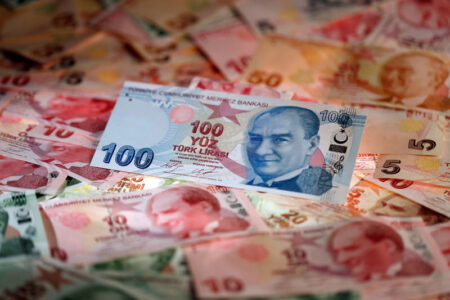© Reuters.
Investing.com – The Turkish lira, which was already under severe pressure, continued its relentless slide after a 650 basis point interest rate hike by the central bank in Ankara. The currency hit new record lows against the euro and the dollar, worrying investors and economists alike.
It recently increased by 2.27% to 24.10 TL, while it increased by 2.32% to 24.49 TL. At the same time, it posted a recovery and was close to record highs again.
The decision of the Central Bank of Turkey to raise the main interest rate by 650 basis points was seen as a positive step but fell short of economists’ expectations. They expected a rate hike to 21% to support the lira and restore market confidence. In its accompanying monetary policy statement, the central bank hinted at further interest rate increases.
Liam Beach, chief emerging markets economist, commented: “Further hikes are needed in the upcoming meetings to address the inflation problem in Turkey. Communications suggest this is coming, although the tightening will be more gradual than was expected a few weeks ago. We I still think rates will go up to 25-30% later this year.”
The increase in the policy rate marked the beginning of a new era for monetary policy under the leadership of Hafiz Gay Erkan. As the new head of the Central Bank, she was appointed by President Erdogan to pursue a more rational monetary policy and control power. Previously, Erdogan viewed high interest rates as an enemy and advocated looser monetary policy.
The central bank’s decision sparked controversy from various quarters. Some economists welcome the move as a necessary step to restore investor confidence and curb inflation. Others see the decision as insufficient to solve the country’s economic problems and continue to call for a stronger increase in interest rates.
High inflation and a weak lira continue to pose major challenges for the Turkish economy. Rising prices affect consumers and businesses and reduce purchasing power. In addition, a weak currency makes it difficult to import goods and increases the country’s debt burden.
